八年级英语上册第二单元知识点归纳
八年级英语上册“Unit 2”必背知识点

八年级英语上册Unit 2 How often do you exercie?必背知识点一、词汇短语1. help with housework:帮助做家务2. go shopping:购物3. on weekends/at weekends:在周末4. how often:多久一次5. hardly ever:几乎不6. once a week/month:每周/月一次7. twice a week/month:每周/月两次8. go to the movies:去看电影9. every day:每天10. use the internet:上网/用网11. be free:有空12. have dance and piano lessons:上舞蹈和钢琴课13. swing dance:摇摆舞14. play tennis:打网球15. stay up late:熬夜16. at least:至少17. go to bed early:早睡18. play sports:锻炼身体19. be good for:对……有好处20. go camping:去野营21. in one’s free time:在某人的空闲时间22. not…at all:根本不23. the most popular:最流行24. such as:例如25. go to the dentist:去看牙医26. old habits die hard:旧习惯难改27. less than:少于/不到二、语法结构1. 频率副词:always, usually, often, sometimes, never 等,用于描述动作发生的频率。
2. “次数”的表达方法:一次once,两次twice,三次或三次以上用基数词+times,如three times,five times。
3. how often 引导的特殊疑问句:用于询问动作发生的频率,回答常含有频率词组或短语。
英语八年级上册第二单元知识点
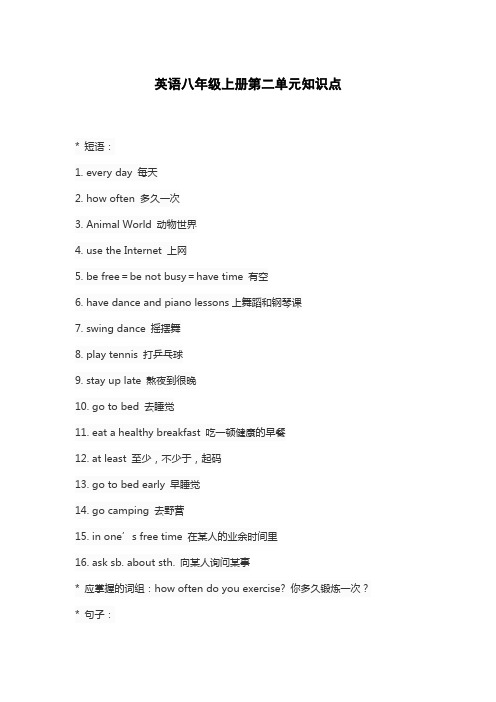
英语八年级上册第二单元知识点* 短语:1. every day 每天2. how often 多久一次3. Animal World 动物世界4. use the Internet 上网5. be free=be not busy=have time 有空6. have dance and piano lessons上舞蹈和钢琴课7. swing dance 摇摆舞8. play tennis 打乒乓球9. stay up late 熬夜到很晚10. go to bed 去睡觉11. eat a healthy breakfast 吃一顿健康的早餐12. at least 至少,不少于,起码13. go to bed early 早睡觉14. go camping 去野营15. in one’s free time 在某人的业余时间里16. ask sb. about sth. 向某人询问某事* 应掌握的词组:how often do you exercise? 你多久锻炼一次?* 句子:1. Do you have enough time to practice the piano every day? 你每天有足够的时间练钢琴吗?2. How often do you watch Animal World? 你多久看一次《动物世界》?3. I usually use the Internet to search for information about science. 我通常上网搜索科学方面的信息。
4. I am always free on weekends. 我总是在周末有空。
5. My sister has dance and piano lessons every day. 我妹妹每天上舞蹈课和钢琴课。
6. Last weekend, we went to a swing dance club and had a great time. 上周末,我们去了一个摇摆舞俱乐部,玩得很开心。
八上英语二单元知识点总结
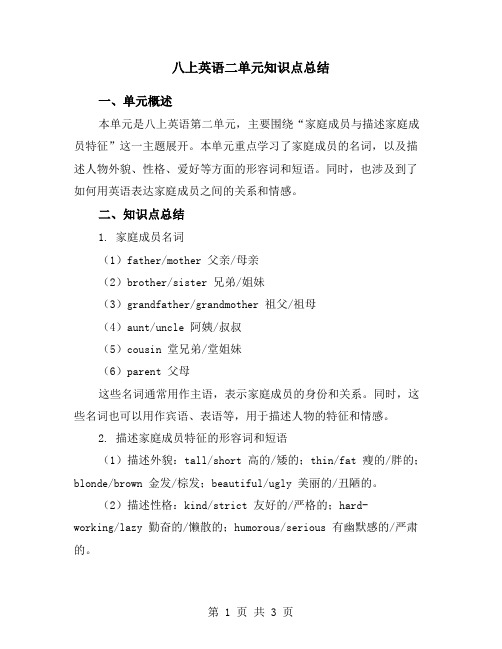
八上英语二单元知识点总结一、单元概述本单元是八上英语第二单元,主要围绕“家庭成员与描述家庭成员特征”这一主题展开。
本单元重点学习了家庭成员的名词,以及描述人物外貌、性格、爱好等方面的形容词和短语。
同时,也涉及到了如何用英语表达家庭成员之间的关系和情感。
二、知识点总结1. 家庭成员名词(1)father/mother 父亲/母亲(2)brother/sister 兄弟/姐妹(3)grandfather/grandmother 祖父/祖母(4)aunt/uncle 阿姨/叔叔(5)cousin 堂兄弟/堂姐妹(6)parent 父母这些名词通常用作主语,表示家庭成员的身份和关系。
同时,这些名词也可以用作宾语、表语等,用于描述人物的特征和情感。
2. 描述家庭成员特征的形容词和短语(1)描述外貌:tall/short 高的/矮的;thin/fat 瘦的/胖的;blonde/brown 金发/棕发;beautiful/ugly 美丽的/丑陋的。
(2)描述性格:kind/strict 友好的/严格的;hard-working/lazy 勤奋的/懒散的;humorous/serious 有幽默感的/严肃的。
(3)描述爱好:sports fan 运动迷;music lover 音乐爱好者;movie buff 电影迷;reading enthusiast 读书爱好者。
这些形容词和短语可以用来修饰家庭成员,表达他们的个性特点和兴趣爱好。
同时,也可以用来描述人物的整体形象和特点。
3. 表达家庭成员之间的关系和情感(1)family members love each other 家庭成员之间互相关爱。
(2)father and mother are my best friends 父亲和母亲是我最好的朋友。
(3)I miss my grandparents very much 我非常想念我的祖父母。
(4)I am proud of my family 我为我的家庭感到自豪。
人教八年级英语上册第2单元知识点总结归纳

人教八年级英语上册第2单元知识点总结归纳Unit2 How often do you exercise?【重点语法】1.频率副词: always, usually, often, sometimes, never频率副词在句中通常放在实义动词之前, be动词或助动词之后。
常用于一般现在时态中。
2.“次数”的表达方法一次once,两次twice,三次或三次以上:基数词+ times,如:three times,five times,3. how often“多久一次”问频率,回答常含有频率词组或短语。
常见的how疑问词:1)How soon多久(以后)—How soon will he be back?他多久能回来?—He will be back in a month.他一个月后能回来。
2)how long“多久”—How long did it take you to clean the house?你打扫房子用了多久?—It took me half an hour to clean the house.我打扫这房子用了半小时。
3)How many+名复How much+不可名“多少”问数量(how much还可问价格)【重点短语】1. go to the XXX去看电影2. look after = take care of照顾3. surf the internet上网4. XXX健康的生活方式5. go XXX去划板6. keep XXX保持健康7. eating habits饮食气8. XXX exercise做更多的活动9. the same as与甚么不异10. be different from分歧11. once a month一月一次12. XXX一周两次14. most of the students=most students15. shop=go shopping=do some shopping购物18. come home from school放学回家19. of course = certainly = sure当然20. get good grades取得好成绩21. keep/be in good health坚持安康22. take a XXX去度假【词语辨析】1. maybe / may bemaybe是副词,意为“大约,大概,也许”,普通用于句首。
八年级上册英语第二单元知识点
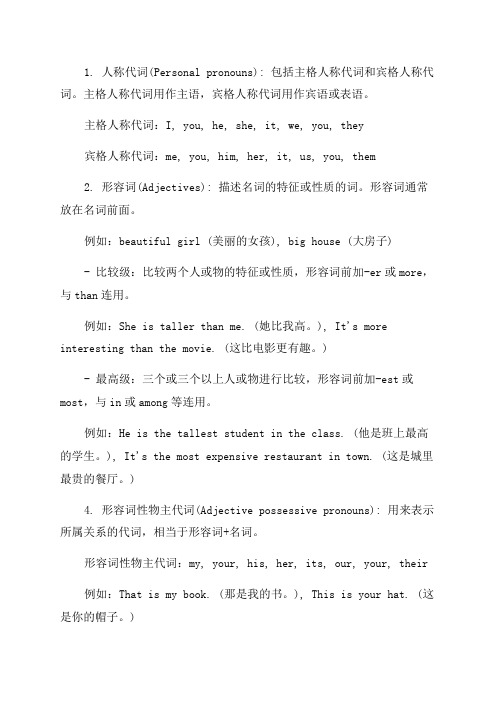
1. 人称代词(Personal pronouns): 包括主格人称代词和宾格人称代词。
主格人称代词用作主语,宾格人称代词用作宾语或表语。
主格人称代词:I, you, he, she, it, we, you, they宾格人称代词:me, you, him, her, it, us, you, them2. 形容词(Adjectives): 描述名词的特征或性质的词。
形容词通常放在名词前面。
例如:beautiful girl (美丽的女孩), big house (大房子)- 比较级:比较两个人或物的特征或性质,形容词前加-er或more,与than连用。
例如:She is taller than me. (她比我高。
), It's more interesting than the movie. (这比电影更有趣。
)- 最高级:三个或三个以上人或物进行比较,形容词前加-est或most,与in或among等连用。
例如:He is the tallest student in the class. (他是班上最高的学生。
), It's the most expensive restaurant in town. (这是城里最贵的餐厅。
)4. 形容词性物主代词(Adjective possessive pronouns): 用来表示所属关系的代词,相当于形容词+名词。
形容词性物主代词:my, your, his, her, its, our, your, their 例如:That is my book. (那是我的书。
), This is your hat. (这是你的帽子。
)5. 名词性物主代词(Noun possessive pronouns): 用来表示所属关系的代词,相当于名词,不需要后面加名词。
名词性物主代词:mine, yours, his, hers, its, ours, yours, theirs例如:Is this pen yours? (这支钢笔是你的吗?), The book on the table is mine. (桌子上的那本书是我的。
八年级上册英语第2单元知识点

八年级上册英语第2单元知识点一、重点单词。
1. housework.- 名词,意为“家务劳动;家务事”。
例如:I often help my mother do housework on weekends.(我经常在周末帮助我妈妈做家务。
)2. hardly.- 副词,意为“几乎不;几乎没有”,本身含有否定意义。
例如:He can hardly speak English.(他几乎不会说英语。
)3. ever.- 副词,意为“在任何时候;从来;曾经”。
常用于现在完成时的一般疑问句和否定句中。
例如:Have you ever been to Beijing?(你曾经去过北京吗?)4. once.- 副词,意为“一次;曾经”。
例如:I go to the movies once a month.(我一个月去看一次电影。
)也可作名词,意为“一次”。
5. twice.- 副词,意为“两次;两倍”。
例如:I have been to Shanghai twice.(我去过上海两次。
)6. Internet.- 名词,意为“(国际)互联网;因特网”。
例如:We can get a lot of information on the Internet.(我们能在互联网上得到很多信息。
)7. program.8. full.- 形容词,意为“忙的;满的;充满的”。
be full of = be filled with,意为“充满……”。
例如:The glass is full of water.(杯子里装满了水。
)9. maybe.- 副词,意为“大概;或许;可能”,一般用于句首。
例如:Maybe he is at home.(也许他在家。
)注意与may be(可能是,作谓语)的区别,如:He may be at home.(他可能在家。
)10. least.- 形容词或副词(little的最高级),意为“最小;最少;最轻微”。
人教版八年级英语上册Unit2知识点汇总总结
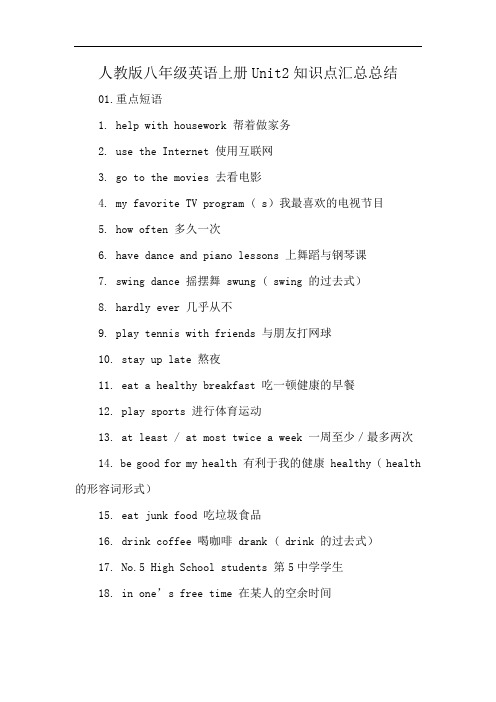
人教版八年级英语上册Unit2知识点汇总总结01.重点短语1. help with housework 帮着做家务2. use the Internet 使用互联网3. go to the movies 去看电影4. my favorite TV program ( s)我最喜欢的电视节目5. how often 多久一次6. have dance and piano lessons 上舞蹈与钢琴课7. swing dance 摇摆舞 swung ( swing 的过去式)8. hardly ever 几乎从不9. play tennis with friends 与朋友打网球10. stay up late 熬夜11. eat a healthy breakfast 吃一顿健康的早餐12. play sports 进行体育运动13. at least / at most twice a week 一周至少/最多两次14. be good for my health 有利于我的健康 healthy ( health 的形容词形式)15. eat junk food 吃垃圾食品16. drink coffee 喝咖啡 drank ( drink 的过去式)17. No.5 High School students 第5中学学生18. in one’s free time 在某人的空余时间19. ask them about their free time activities 询问他们关于他们的业余活动20. not … at all 根本不…21. go online 上网22. be surprised that ..感到惊讶23. use it for fun 为了取乐而使用它24. the answers to the questions 这些问题的答案25. one to three times a week 一周一到三次26. two percent of the students 2%的学生27. the best way to do sth.做某事的最好方式28. such as 例如29. spend time with your friends 与你的朋友共度时光spent ( spend 的过去式)30. spend time on sth./ in doing sth.花时间在某事上/做某事31. play together 一起玩32. watch TV for over 2 hours 看两个多小时电视33. go to the dentist 去看牙医34. a 16-year-old high school student 一名16岁的中学生35. have a lot of good habits 有许多好习惯36. more / less than two hours 多/少于两小时37. go to the dentist for teeth cleaning 去牙医处清洁牙齿38. go to the shopping center 去购物中心02.重点句子语法聚焦1. --What do you usually do on weekends?你在周末通常做什么?--I always exercise.我总是锻炼。
八年级英语上册Unit-2-How-often-do-you-exercise知识点归纳

八年级英语上册Unit 2 How often do you exercise知识点归纳八年级英语上册Unit 2 How often do you exercise知识点归纳一、词组、短语:1、help with housework 帮助做家务活,2、go shopping 购物,3、on weekends 在周末,4、how often 多久一次,5、hardly ever几乎不,6、once a week 每周一次,7、twice a month每月二次,8、go to the movies去看电影,9、every day 每天,10、use the Internet上网/用网,11、be free有空,12、have dance and piano lessons 上舞蹈钢琴课,13、swing dance摇摆舞14、play tennis 打网球,15、stay up late熬夜,16、at least至少,17、go to bed early 早睡,18、 play sports 锻炼身体,19、be good for 对…有好处,20、go camping去野营,21、in one’s free time 在某人的空闲时间,22、not….at all 根本不,23、the most popular 最流行,24、such as例如,25、go to the dentist去看牙医,26、more than 超过/多于,27、Old habits die hard.旧习惯难改。
28、 hard=difficult 困难的,29、less than 少于/不到二、重要句子(语法):What do you usually do on weekends你周末通常做什么 I always exercise.总是锻炼身体。
What do they do on weekends他们周末干什么 They often help with housework.他们经常帮助干家务活。
八年级上册英语二单元知识点
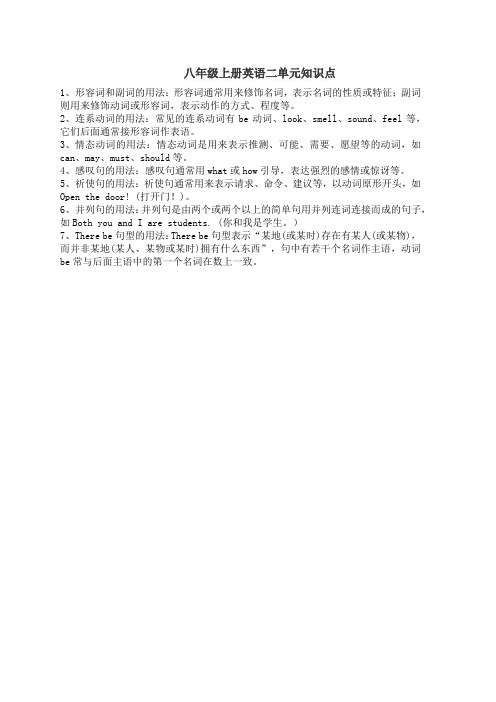
八年级上册英语二单元知识点
1、形容词和副词的用法:形容词通常用来修饰名词,表示名词的性质或特征;副词则用来修饰动词或形容词,表示动作的方式、程度等。
2、连系动词的用法:常见的连系动词有be动词、look、smell、sound、feel等,它们后面通常接形容词作表语。
3、情态动词的用法:情态动词是用来表示推测、可能、需要、愿望等的动词,如can、may、must、should等。
4、感叹句的用法:感叹句通常用what或how引导,表达强烈的感情或惊讶等。
5、祈使句的用法:祈使句通常用来表示请求、命令、建议等,以动词原形开头,如Open the door! (打开门!)。
6、并列句的用法:并列句是由两个或两个以上的简单句用并列连词连接而成的句子,如Both you and I are students. (你和我是学生。
)
7、There be句型的用法:There be句型表示“某地(或某时)存在有某人(或某物),而并非某地(某人、某物或某时)拥有什么东西”,句中有若干个名词作主语,动词be常与后面主语中的第一个名词在数上一致。
八年级上册英语unit2知识点归纳
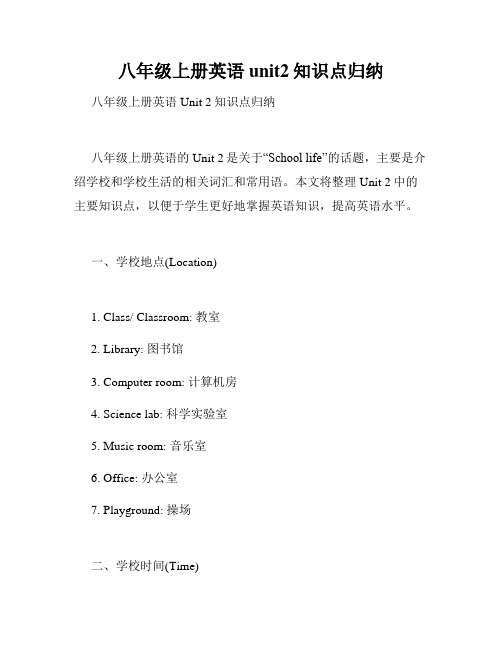
八年级上册英语unit2知识点归纳八年级上册英语Unit 2知识点归纳八年级上册英语的Unit 2是关于“School life”的话题,主要是介绍学校和学校生活的相关词汇和常用语。
本文将整理Unit 2中的主要知识点,以便于学生更好地掌握英语知识,提高英语水平。
一、学校地点(Location)1. Class/ Classroom: 教室2. Library: 图书馆3. Computer room: 计算机房4. Science lab: 科学实验室5. Music room: 音乐室6. Office: 办公室7. Playground: 操场二、学校时间(Time)1. Class time: 上课时间2. Break time: 休息时间3. Lunch time: 午饭时间4. After-school program: 放学后活动三、学校相关人员(People)1. Teacher: 教师2. Student: 学生3. Principal: 校长4. Office staff: 办公人员5. Janitor: 门卫四、学校课程(Curriculum)1. Subject: 科目2. Math: 数学3. Science: 科学4. Social studies: 社会科学5. English: 英语6. Art: 艺术7. Music: 音乐8. PE(Physical education): 体育五、学校生活(School life)1. Attend school/ Go to school: 上学2. Take a bus/ Walk to school: 坐校车/ 步行3. Eat lunch/ Buy lunch: 吃午饭/ 买午饭4. Study for an exam: 为考试学习5. Join a club/ Sports team: 参加俱乐部/ 运动队6. Do homework/ Studying: 做作业/ 学习7. Use a computer: 使用电脑六、常用口语(Common expressions)1. What time is it? : 现在几点了?2. Good morning/ afternoon/ evening: 早上/ 下午/ 晚上好3. How are you? : 你好吗?4. What class do you have now? : 你现在有什么课?5. I’m sorry/ Excuse me: 对不起/ 打扰一下6. Can you help me please? : 你能帮我一下吗?7. Thank you: 谢谢8. Goodbye: 再见总结:本文所归纳的知识点为八年级上册英语Unit 2的内容,主要是围绕“School life”话题展开的。
人教版八年级上册第二单元知识点归纳
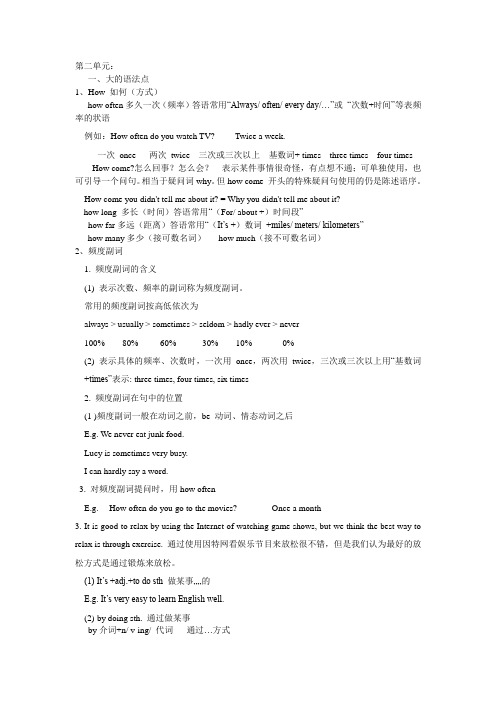
第二单元:一、大的语法点1、How 如何(方式)how often多久一次(频率)答语常用“Always/ often/ every day/…”或“次数+时间”等表频率的状语例如:How often do you watch TV? ----Twice a week.一次once 两次twice 三次或三次以上基数词+ times three times four times How come?怎么回事?怎么会?表示某件事情很奇怪,有点想不通;可单独使用,也可引导一个问句。
相当于疑问词why。
但how come 开头的特殊疑问句使用的仍是陈述语序。
How come you didn't tell me about it? = Why you didn't tell me about it?how long 多长(时间)答语常用“(For/ about +)时间段”how far多远(距离)答语常用“(It’s +)数词+miles/ meters/ kilometers”how many多少(接可数名词)how much(接不可数名词)2、频度副词1. 频度副词的含义(1) 表示次数、频率的副词称为频度副词。
常用的频度副词按高低依次为always > usually > sometimes > seldom > hadly ever > never100% 80% 60% 30% 10% 0%(2) 表示具体的频率、次数时,一次用once,两次用twice,三次或三次以上用“基数词+times”表示: three times, four times, six times2. 频度副词在句中的位置(1 )频度副词一般在动词之前,be 动词、情态动词之后E.g. We never eat junk food.Lucy is sometimes very busy.I can hardly say a word.3. 对频度副词提问时,用how oftenE.g. ---How often do you go to the movies? ---Once a month3. It is good to relax by using the Internet of watching game shows, but we think the best way torelax is through exercise. 通过使用因特网看娱乐节目来放松很不错,但是我们认为最好的放松方式是通过锻炼来放松。
八年级上册英语unit2知识点归纳人教版
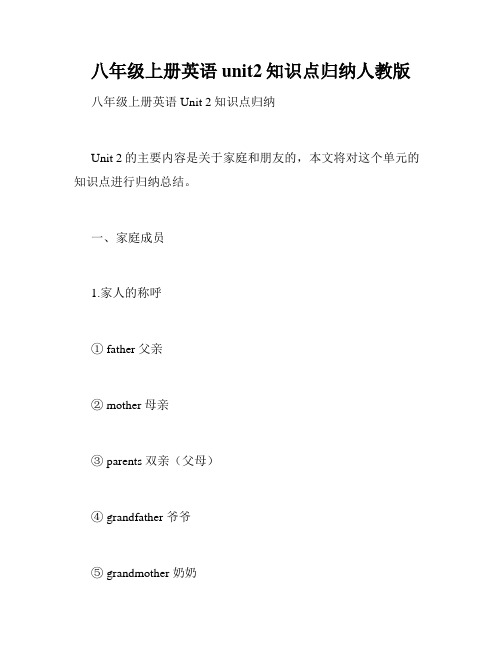
八年级上册英语unit2知识点归纳人教版八年级上册英语Unit 2知识点归纳Unit 2的主要内容是关于家庭和朋友的,本文将对这个单元的知识点进行归纳总结。
一、家庭成员1.家人的称呼① father 父亲② mother 母亲③ parents 双亲(父母)④ grandfather 爷爷⑤ grandmother 奶奶⑥ grandparents 祖父母(外公外婆或者爷爷奶奶)⑦ son 儿子⑧ daughter 女儿⑨ children 孩子⑩ elder brother 哥哥⑪ younger brother 弟弟⑫ elder sister 姐姐⑬ younger sister 妹妹2.家庭成员的职业father:teacher, doctor, businessman, worker…mother:nurse, musician, artist, housewife…grandfather / grandmother:retired, farmer, scientist, writer…brother / sister:student, athlete, musician, artist, …二、家务1.厨房用具① microwave 微波炉② refrigerator 冰箱③ stove 火炉④ oven 烤箱⑤ blender 搅拌器⑥ toaster 烤面包机⑦ kettle 水壶2.家务动词① cook 做饭② wash the dishes 洗碗③ sweep 扫地④ mop 拖地⑤ clean the bathroom 打扫浴室⑥ make the bed 整理床铺⑦ do the laundry 洗衣服三、朋友1.朋友类型① best friend 最好的朋友② close friend 亲密的朋友③ new friend 新朋友④ childhood friend 童年时的朋友⑤ schoolmate 同学2.谈论朋友的习惯和特点① He / She is always there for me. 他 / 她总是在我身边。
八年级上册英语第二单元短语
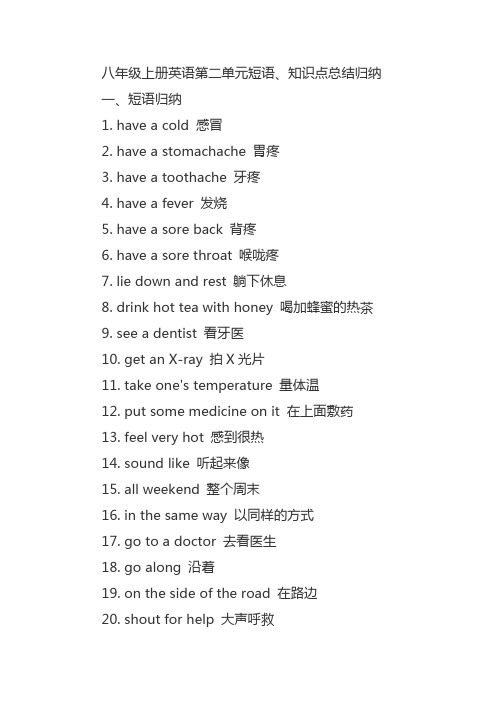
八年级上册英语第二单元短语、知识点总结归纳一、短语归纳1. have a cold 感冒2. have a stomachache 胃疼3. have a toothache 牙疼4. have a fever 发烧5. have a sore back 背疼6. have a sore throat 喉咙疼7. lie down and rest 躺下休息8. drink hot tea with honey 喝加蜂蜜的热茶9. see a dentist 看牙医10. get an X-ray 拍X光片11. take one's temperature 量体温12. put some medicine on it 在上面敷药13. feel very hot 感到很热14. sound like 听起来像15. all weekend 整个周末16. in the same way 以同样的方式17. go to a doctor 去看医生18. go along 沿着19. on the side of the road 在路边20. shout for help 大声呼救21. without thinking twice 没有多想22. get off 下车23. have a heart problem 有心脏病24. to one's surprise 使某人惊讶的是25. thanks to 多亏了;由于26. in time 及时27. save a life 挽救生命28. make a decision 做出决定29. get into trouble 遇到麻烦二、重点句型1. What's the matter? (= What's the trouble? / What's wrong? / What's the problem? ) 怎么了?I have a headache. 我头疼。
八年级上册英语第二单元知识点
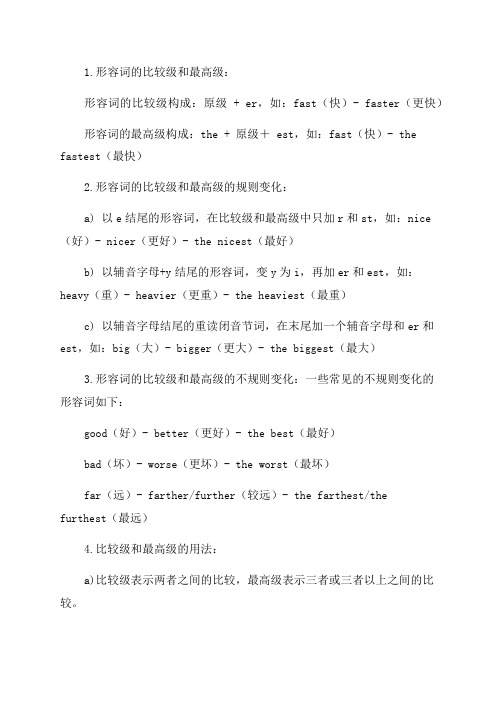
1.形容词的比较级和最高级:形容词的比较级构成:原级 + er,如:fast(快)- faster(更快)形容词的最高级构成:the + 原级+ est,如:fast(快)- the fastest(最快)2.形容词的比较级和最高级的规则变化:a) 以e结尾的形容词,在比较级和最高级中只加r和st,如:nice (好)- nicer(更好)- the nicest(最好)b) 以辅音字母+y结尾的形容词,变y为i,再加er和est,如:heavy(重)- heavier(更重)- the heaviest(最重)c) 以辅音字母结尾的重读闭音节词,在末尾加一个辅音字母和er和est,如:big(大)- bigger(更大)- the biggest(最大)3.形容词的比较级和最高级的不规则变化:一些常见的不规则变化的形容词如下:good(好)- better(更好)- the best(最好)bad(坏)- worse(更坏)- the worst(最坏)far(远)- farther/further(较远)- the farthest/thefurthest(最远)4.比较级和最高级的用法:a)比较级表示两者之间的比较,最高级表示三者或三者以上之间的比较。
b) 形容词的比较级前可以用much, a little, a bit等词修饰,最高级前可以用the修饰,表示最。
c)两个人或物进行比较时,用比较级,三个人或物进行比较时,用最高级。
5.表示原因的连词:a) because表示因果关系,连接原因和结果。
b) so表示因果关系,连接结果和原因。
c) because和so可以分别带上述连接词来连接复合句的句子。
d) though虽然,意为“尽管”,引导让步状语从句。
6.定义关系的连词:a) that引导定语从句,修饰先行词并起定义作用。
b) who/whom引导定语从句,修饰先行词表示人。
c) which引导定语从句,修饰先行词表示物。
八年级上册英语知识点归纳-Unit2

八年级上册英语知识点归纳 - Unit 21. 单词篇本单元的主要单词包括: - advantage: 优点 - career: 职业 - challenge: 挑战 - competition: 竞争 - effective: 有效的 - improve: 改进 - opportunity: 机会 - popular:流行的 - position: 职位 - recommend: 推荐 - research: 研究 - responsibility: 责任 - skill: 技能 - volunteer: 志愿者2. 语法篇2.1 There be句型本单元的语法重点是There be句型,该句型用于描述某地存在或出现的事物。
There be句型的构成为: > There + is/are + 名词 + 其他成分例如:There is a book on the table.(桌子上有一本书。
)当表达存在复数事物时,使用there are。
例如:There are some apples in the basket.(篮子里有一些苹果。
)2.2 形容词的比较级与最高级另一个重点是形容词的比较级与最高级。
形容词的比较级用于比较两个人或事物的程度,而最高级则用于比较三个或三个以上的人或事物的程度。
形容词的比较级和最高级的构成为: - 比较级:原级 + er - 最高级:原级 + est例如:good(好)- better(更好)- best(最好)2.3 情态动词“should”本单元也介绍了情态动词“should”,它用于表示建议或应该做某事。
例如:You should study hard.(你应该努力学习。
)3. 课文篇本单元的课文主要围绕“我的未来计划”展开,通过介绍不同的职业和志愿者活动来启发学生思考自己的未来规划。
课文中出现了一些常用的句型和表达方式,例如: - What do you want to be when you grow up?(你长大后想做什么?) - I want to be a teacher / engineer / musician, etc.(我想成为一名老师/工程师/音乐家。
八年级上册英语第二单元的知识点

八年级上册英语第二单元的知识点摘要:一、单元概述1.单元主题:家庭与人物介绍2.单元目标:学习家庭成员的英文表达,掌握一般现在时态的疑问句和否定句二、知识点详解1.家庭关系词汇- 家庭成员:父母、兄弟姐妹、祖父母、孙子孙女- 亲戚:叔叔、姑姑、堂兄弟姐妹、表兄弟姐妹2.一般现在时态- 肯定句结构:主语+ 动词原形/三单形式+ 其它成分- 疑问句结构:Be 动词/助动词+ 主语+ 其它成分?- 否定句结构:主语+ be 动词/助动词+ not + 动词原形/三单形式+ 其它成分3.一般现在时态的疑问句和否定句- 疑问句:Be 动词/助动词+ 主语+ 其它成分?- 否定句:主语+ be 动词/助动词+ not + 动词原形/三单形式+ 其它成分正文:在八年级上册英语第二单元中,我们学习了与家庭和人物介绍相关的知识点。
本单元的主题是家庭,通过学习家庭成员的关系和英文表达,同学们可以更好地理解和描述自己的家庭。
首先,我们学习了家庭成员的英文词汇。
包括父母(mom, dad)、兄弟姐妹(brother, sister)、祖父母(grandparent)、孙子孙女(grandson, granddaughter)等。
此外,还学习了亲戚的英文表达,如叔叔(uncle)、姑姑(aunt)、堂兄弟姐妹(cousin)和表兄弟姐妹(second cousin)等。
掌握这些词汇有助于同学们在描述家庭成员时更加准确和全面。
其次,本单元重点讲解了一般现在时态。
一般现在时态表示经常发生或习惯性的动作,例如:I get up at 7:00 in the morning.(我早上七点起床。
)在一般现在时态中,动词通常使用原形或第三人称单数形式。
此外,我们还学习了如何用一般现在时态提问和否定。
在疑问句中,我们使用Be 动词或助动词(如is, are, do, does)来构成疑问句,如:Do you have breakfast at 7:00?(你早上七点吃早餐吗?)在否定句中,我们在主语后加上Be 动词或助动词以及not,如:I don"t watch TV after dinner.(我晚餐后不看电视。
八年级上册英语第二单元知识点归纳

【导语】以下是为您整理的⼋年级上册英语第⼆单元知识点归纳,供⼤家学习参考。
现在完成时: 1.表⽰过去发⽣的动作对现在造成的影响,或结果,常与recently,ever,never,already,yet,just,beforestill连⽤; 2.表⽰发⽣在过去并且⼀直持续到现在的动作或状态,常与for+时间段或since+时间点连⽤。
结构:have(has)+过去分词, getinto=enter进⼊,what'sthepriceof…=howmuchis…问价格 dreamabout梦到,dreamof梦见, aroundtheworld=allovertheworld全世界, staywithsb.与某⼈呆⼀起stayathome呆在家⾥, stayinbed呆在床上,walkto=goto…onfoot步⾏去 takeoff脱下,起飞,landon/in/at着路, alloverChina,全中国,takeaseat=haveaseat请坐, cometure实现,flyto=goto...byplane(byair),坐飞机 driveto=goto…bycar开车,attheendof在…尽头/结尾 sellout卖光,attheend在结束时, havebeento去过(现在不在那⼉),havegoneto去了(现在不在说话地) everydayEnglish⽇常英语,firstprice⼀等奖, Themostexcitingexperience最激动⼈⼼的经历,beforelong不久, longbefore=soon=alittlelater很久以前,noproblem没问题, haveaproblemindoingsth.做某事有困难,workoutaproblem解决⼀个问题, invitesbtodosth,邀请某⼈做某事invitesbtosomeplace邀请某⼈去某地, oneday,某⼀天,(过去或将来)someday某⼀天(将来), 连系动词,⼀是be(am,is,are,was,were,)⼀感觉feel,⼀保持keep,三变become,getturn, 四起来taste,smell,look,sound,后跟形容词作表语。
最全面人教版八年级上册英语第二单元知识点归纳总结
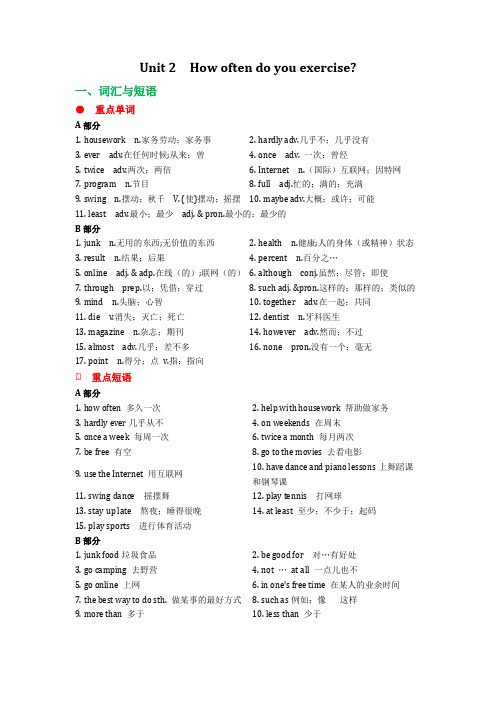
Unit 2 How often do you exercise?一、词汇与短语●重点单词A部分1.housework n.家务劳动;家务事2.hardly adv.几乎不;几乎没有3.ever adv.在任何时候;从来;曾4.once adv. 一次;曾经5.twice adv.两次;两倍6.Internet n.(国际)互联网;因特网7.program n.节目8.full adj.忙的;满的;充满9.swing n.摆动;秋千V. (使)摆动;摇摆10.maybe adv.大概;或许;可能11.least adv.最小;最少adj. & pron.最小的;最少的B部分1.junk n.无用的东西;无价值的东西2.health n.健康;人的身体(或精神)状态3.result n.结果;后果4.percent n.百分之…5.online adj. & adp.在线(的);联网(的)6.although conj.虽然;尽管;即使7.through prep.以;凭借;穿过8.such adj. &pron.这样的;那样的;类似的9.mind n.头脑;心智10.together adv.在一起;共同11.die v.消失;灭亡;死亡12.dentist n.牙科医生13.magazine n.杂志;期刊14.however adv.然而;不过15.almost adv.几乎;差不多16.none pron.没有一个;毫无17.point n.得分;点v.指;指向● 重点短语A部分1.how often 多久一次2.help with housework 帮助做家务3.hardly ever几乎从不4.on weekends 在周末5.once a week 每周一次6.twice a month 每月两次7.be free 有空8.go to the movies 去看电影e the Internet 用互联网10.have dance and piano lessons上舞蹈课和钢琴课11.swing dance 摇摆舞12.play tennis 打网球13.stay up late 熬夜;睡得很晚14.at least 至少;不少于;起码15.play sports 进行体育活动B部分1.junk food垃圾食品2.be good for 对…有好处3.go camping 去野营4.not …at all 一点儿也不5.go online 上网6.in one's free time 在某人的业余时间7.the best way to do sth. 做某事的最好方式8.such as例如;像这样9.more than 多于10.less than 少于● 重点句子A部分1.--What do you usually do on weekends? --I often go to the movies."在周末你通常做什么?”“我经常去看电影。
八年级上册英语第二单元知识点

八年级上册英语第二单元知识点八年级上册英语第二单元知识点整理随着全球化的发展,英语已成为连接世界的桥梁,学好英语将有助于个人在职业、学术和文化等方面取得更多的机会和成功。
以下是我为大家带来的八年级上册英语第二单元知识点整理,欢迎参阅呀!八年级上册英语第二单元知识点整理一、词语:1.matter: [′mætə]1)名词n. ① 事情;问题;事件[C]It was a matter of life and death for them.这事对他们来说是生死攸关。
What is the matter with this car?这辆汽车出了什么毛病?2)不及物动词 vi.①(常用于否定句和疑问句)有关系,要紧。
②It does not matter(if…)(即使……也)不要紧例如:When talking about fighting battles, Comrade Liu Bocheng often quotes a Sichuan proverb It does not matter if it is a yellow cat or a black cat, as long as it catches mice.2.back: [bæk]1)名词n.① 背脊,背部[C](in and on 的用法)Someone patted me on the back. 有人在我背上轻轻地拍了一下。
②后部[the S][(+of)]Grandpa and grandma sat in the back of the car.2)副词 adv..在原处;回原处come back形容词 adj. [Z]后面的,后部的He sat in the back seat of the car. 他坐在车子后面的座位上。
3.Rest:[rest]1)不及物动词 vi. 休息;睡; rests with sb ,2) 及物动词 The doctor tried to rest his patients mind at ease.3) The rest of the eggs , have a rest4、5.so: [səu]1)副词 adv. 这么,那么;【口】多么,非常Im so pleased to see you. 看到你我真高兴。
八年级上册英语第二单元知识点归纳
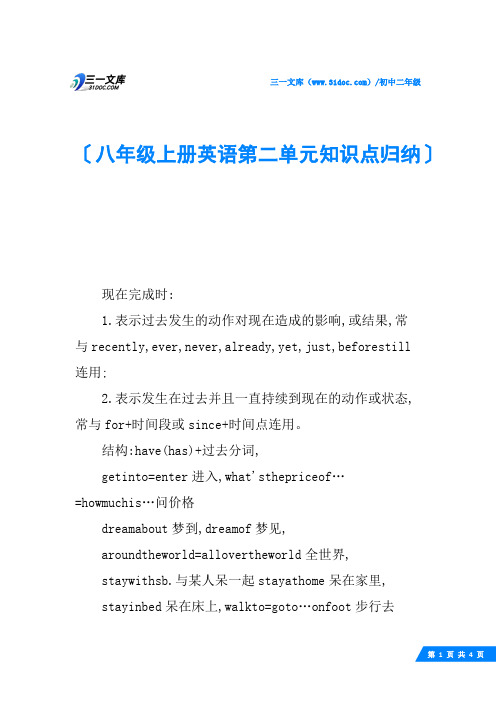
三一文库()/初中二年级〔八年级上册英语第二单元知识点归纳〕现在完成时:1.表示过去发生的动作对现在造成的影响,或结果,常与recently,ever,never,already,yet,just,beforestill连用;2.表示发生在过去并且一直持续到现在的动作或状态,常与for+时间段或since+时间点连用。
结构:have(has)+过去分词,getinto=enter进入,what'sthepriceof…=howmuchis…问价格dreamabout梦到,dreamof梦见,aroundtheworld=allovertheworld全世界,staywithsb.与某人呆一起stayathome呆在家里,stayinbed呆在床上,walkto=goto…onfoot步行去第1页共4页takeoff脱下,起飞,landon/in/at着路,alloverChina,全中国,takeaseat=haveaseat请坐,eture实现,flyto=goto...byplane(byair),坐飞机driveto=goto…bycar开车,attheendof在…尽头/结尾sellout卖光,attheend在结束时,havebeento去过(现在不在那儿),havegoneto去了(现在不在说话地)everydayEnglish日常英语,firstprice一等奖,Themostexcitingexperience最激动人心的经历,beforelong不久,longbefore=soon=alittlelater很久以前,noproblem没问题,haveaproblemindoingsth.做某事有困难,workoutaproblem解决一个问题,invitesbtodosth,邀请某人做某事invitesbtosomeplace邀请某人去某地,oneday,某一天,(过去或将来)someday某一天(将来),连系动词,一是be(am,is,are,was,were,)一感觉feel,一保持keep,三变bee,getturn,四起来taste,smell,look,sound,后跟形容词作表语。
- 1、下载文档前请自行甄别文档内容的完整性,平台不提供额外的编辑、内容补充、找答案等附加服务。
- 2、"仅部分预览"的文档,不可在线预览部分如存在完整性等问题,可反馈申请退款(可完整预览的文档不适用该条件!)。
- 3、如文档侵犯您的权益,请联系客服反馈,我们会尽快为您处理(人工客服工作时间:9:00-18:30)。
八年级英语上册第二单元知识点归纳
文档编制序号:[KK8UY-LL9IO69-TTO6M3-MTOL89-FTT688]
Unit2 How often do you exercise
一、短语归纳
help with housework帮助做家务 on weekends在周末 how often多久一次
hardly ever几乎从不 once a week每周一次 twice a month每月两次 every day每天 go to the movies去看电影 go to the dentist去看牙医
use the Internet用互联网 swing dance摇摆舞 play tennis打网球
stay up late熬夜;睡得很晚 at least至少 go camping去野营
have dance and piano lessons上舞蹈课和钢琴课 go to bed early
早点睡觉 play sports进行体育活动 morn than多于;超过go online 上网
not…at all一点儿也不…… in one’s free time在某人的业余时间less than少于
the most popular最受欢迎的 such as比如;诸如
be free有空
old habits die hard积习难改 fifteen percent of……的百分之十五 junk food 垃圾食品
二、知识点归纳
1. help sb. with sth.帮助某人做某事 help sb. (to) do sth.
2. be good for对……有好处 be good with 对....有办法 be good at 擅长做....
3. How about…(doing) = What about……(doing) ......怎么样
/ ……好不好
4. want sb. to do sth.想让某人做某事
5. How many+可数名词复数+一般疑问句……有多少……
6. 主语+find that从句. ……发现……
7. spend time with sb.和某人一起度过时光
spend 时间/金钱 (in) doing sth. spend 时间/金钱on sth. 花费时间/金额做某事
8. It’s+ adj.(for sb)+ to do sth. 做某事是……的。
9. ask sb. about sth.向某人询问某事 ask sb.(not) to do sth. 要求某人做某事
10. by doing sth. 通过做某事
11. What’s your favorite……你最喜爱的……是什么
12. the best way to do sth.做某事的最好方式
the answers to our questions 问题的答案
13. although 尽管,不能与but同时用。
14. be afraid of doing sth. 害怕做某事 be afraid to do sth. 不
敢做某事
三、句子
1. How often do you exercise 你多久做一次锻炼 Twice a week.
2. What do you usually do on the weekend 你周末通常做什么
3. Are you free next week 你下周有空吗
4. What kind of dance are you learning 你正在学什么种类的舞蹈
5. How many hours do you usually sleep at night 晚上你通常睡多
少小时
四、作文:以Exercise is a good way to keep healthy为题目写一篇
作文
Exercising can help people to keep healthy. It makes your body strong. You can exercise three or four times a week. Half
an hour each time is enough. There are many ways to do exercise. You can go running, swimming or play balls and so on. I think exercise is funny. I like exercising.。
